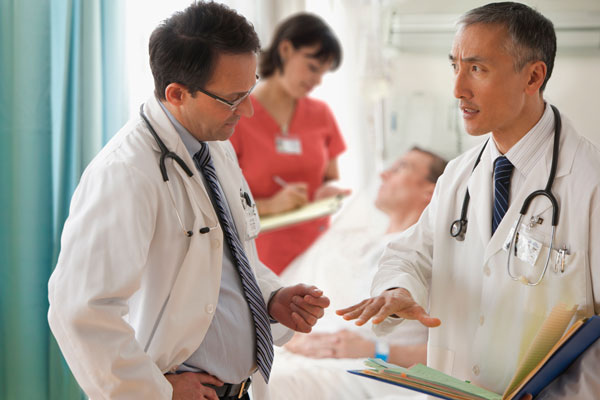Educational Experiences

Resident education takes place in a number of different ways, including four-week block rotations, continuity experiences and conferences/workshops. Block rotations take place in a variety of settings and are taught by residency faculty and volunteer attendings. Each rotation provides a concentrated and focused experience in one or more facets of family medicine.
Longitudinal Experiences
In addition to the focused block rotations, residents are also involved in certain educational components in a longitudinal fashion. These continuity experiences include Balint Group, Geriatrics, Junior Precepting, Practice Management, the Research Seminar, Sports Medicine, and various conferences and workshops.
Balint Group
Balint Group is scheduled for residents on a monthly basis, and residents are encouraged to attend whenever possible. These groups are facilitated by the faculty including a psychologist and one of the physicians. The focus is on the interpersonal and emotional components involved in the practice of medicine including communications and relationships with patients and their families, other residents, faculty and staff.
Conferences
Noon Conferences are scheduled throughout the year with lunch catering. During the noon conferences, all the residents and faculty get together to discuss topics which are relevant to Family Medicine. Residents are involved in selecting both topics and speakers. Conferences occur almost every weekday and include leadership lecture series, morbidity & mortality, board review questions, AAFP article review, didactics, case presentations, and guest speakers. Procedural workshops are scheduled once a month in the afternoon throughout the year. During Procedure Workshop, Residents learns procedural skills such as: Joint injection with Ultrasound guided, Skin Biopsy, splinting and casting, circumcision, etc... Team Based Learning is scheduled once a month in the afternoon throughout the year . During Team based learning activity, residents were given a personal quiz . After we finished a quiz, we got together as a team to discuss the right answers for those questions. Afterwards, the faculty will gave us lectures about that specific topic.
Geriatrics
The primary purpose of the Geriatrics rotation is to give our residents the tools and skills to care for elderly patients. During the second year we have a required rotation where residents get experience in evaluating senior patients, care for patients at a Medicare Skilled Unit, experience wound care treatment and experience home health care. The longitudinal experience includes doing home visits during all three years of residency. We expect our residents to be able to care for their patients in the home. During the second and third years, each resident visits patients at an excellent nursing home with a full time geriatric family physician. Also, during each block we have scheduled conferences on geriatric issues.
Junior Precepting
We believe that all family physicians are teachers (teaching students, fellow residents, and patients), and help residents acquire those skills. As part of that process, each third-year resident spends a half-day each block in our family medicine center where he or she acts as a “junior preceptor.” In this role the senior resident provides feedback and guidance on patient care to junior residents, under the supervision of a faculty attending.
Practice Management
Practice Management is designed to provide residents with the information they need regarding the business of health care. Residents will complete their training with a working knowledge of coding and documentation, billing and collections, managed care, risk management, professional liability insurance, forecasting, financial planning and other areas of practice management that will be important to their success, regardless of the setting. The curriculum will include a minimum of 100 hours of training with the greatest amount of this time reserved for the second and third years of training. Residents will acquire knowledge using several modalities, including self-study, speakers, workshops and hands-on learning. Residents will also complete assigned modules of the AMA Introduction to Practice Management online training program throughout the three-year program.

Pod Research Meetings
Pod research meetings allow faculty, residents and nurses to work together and develop a research project on an annual basis. There are ten lunchtime meetings throughout the year and end with a poster session in June. The meetings are broken into three modules:
Principles of evidence-based medicine: study design, literature search Navigating the research process: flow maps, PDSA cycles Statistical concepts: T-tests, risk reduction, linear regression
Working in pods, each group will design a research project and implement it with their patients. At the end of the academic year, each group will present a poster and with the information they gathered. Residents are encouraged to present these posters on the state and national level ase well. For residents with a specific interest in research, a research elective block rotation is also available in the second and third years to provide sheltered time for gathering, analyzing, and interpreting data.
Journal Club
Another educational component of resident scholarly development is practice in the evaluation of the medical literature. This is the main focus of the series of one-hour Journal Club discussions, which occur at noontime, once each block throughout the year. Two residents (a second and third year) critically analyze an article during each session, and the audience engages in a lively discussion at the ends of their respective presentations.
Sports Medicine
During this rotation, residents work with primary care sports medicine physicians, orthopedic surgeons, physical therapists, and athletic trainers reinforcing principles of musculoskeletal medicine as well as evaluating and managing medical problems specific to competitive athletes, active people, and people considering exercise. The rotation builds on previous experiences in radiographic interpretation, fracture management, and joint injections. Residents gain experience performing pre-participation physicals and providing medical coverage during athletic events. Residents will also provide medical care in a collegiate training room. Residents interested in gaining extra experience in sports medicine may serve as assistant team physicians for local teams. This rotation takes place at Physicians at Sugar Creek, Houston Baptist University, as well as in the offices of our volunteer private community orthopedic surgeons.